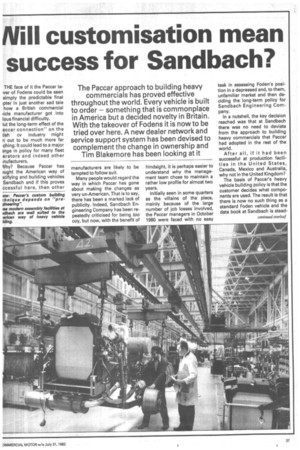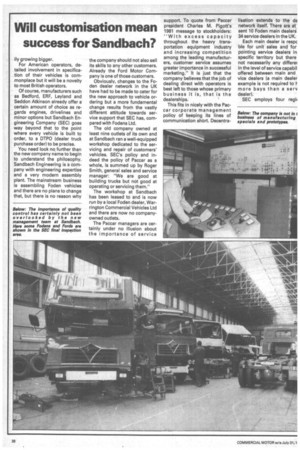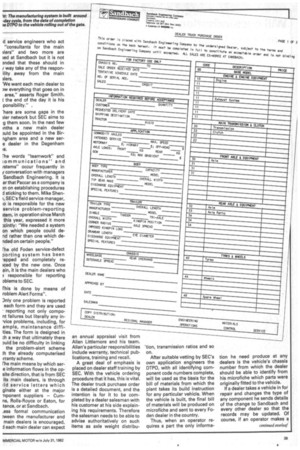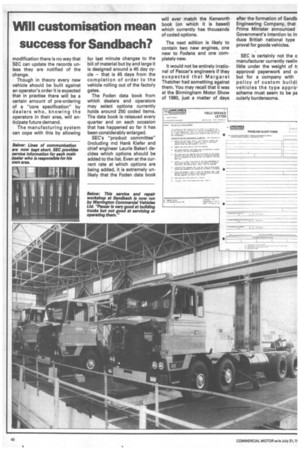Nil customisation mean success for Sandbach?
Page 29

Page 30

Page 31

Page 32

If you've noticed an error in this article please click here to report it so we can fix it.
The Paccar approach to building heavy commercials has proved effective throughout the world. Every vehicle is built to order — something that is commonplace in America but a decided novelty in Britain. With the takeover of Fodens it is now to be tried over here. A new dealer network and service support system has been devised to complement the change in ownership and Tim Blakemore has been looking at it
THE face of it the Paccar taver of Fodens could be seen simply the predictable final Ipter in just another sad tale how a British commercial iicle manufacturer got into ious financial difficulty.
lut the long-term effect of the accar connection" on the tish cv industry might n out to be much more far ching. It could lead to a major Inge in policy for many fleet erators and indeed other Inufacturers.
Vhy? Because Paccar has night the American way of .icifying and building vehicles Sandbach and if this proves ccessful here, then other manufacturers are likely to be tempted to follow suit.
Many people would regard the way in which Paccar has gone about making the changes as very un-American. That is to say, there has been a marked lack of publicity. Indeed, Sandbach Engineering Company has been repeatedly criticised for being too coy, but now, with the benefit of hindsight, it is perhaps easier to understand why the management team chose to maintain a rather low profile for almost two years.
Initially seen in some quarters as the villains of the piece, mainly because of the large number of job losses involved, the Paccar managers in October 1980 were faced with no easy task in assessing Foden's position in a depressed and, to them, unfamiliar market and then deciding the long-term policy for Sandbach Engineering Company.
In a nutshell, the key decision reached was that at Sandbach there was no need to deviate from the approach to building heavy commercials that Paccar had adopted in the rest of the world.
After all, if it had been successful at production facilii es in the United States, Canada, Mexico and Australia, why not in the United Kingdom?
The basis of Paccar's heavy vehicle building policy is that the customer decides what components are used. The result is that there is now no such thing as a standard Foden vehicle and the data book at Sandbach is stead ily growing bigger.
For American operators, detailed involvement in specification of their vehicles is commonplace but it will be a novelty to most British operators.
Of course, manufacturers such as Bedford, ERF, Leyland and Seddon Atkinson already offer a certain amount of choice as regards engines, drivelines and minor options but Sandbach Engineering Company (SEC) goes way beyond that to the point where every vehicle is built to order, to a DTPO (dealer truck purchase order) to be precise.
You need look no further than the new company name to begin to understand the philosophy. Sandbach Engineering is a company with engineering expertise and a very modern assembly plant. The mainstream business is assembling Foden vehicles and there are no plans to change that, but there is no reason why the company should not also sell its skills to any other customers. Already the Ford Motor Company is one of those customers.
Obviously, changes to the Foden dealer network in the UK have had to be made to cater for the new approach to vehicle ordering but a more fundamental change results from the vastly different attitude towards service support that SEC has, compared with Fodens Ltd.
The old company owned at least nine outlets of its own and at Sandbach ran a well-equipped workshop dedicated to the servicing and repair of customers' vehicles. SEC's policy and indeed the policy of Paccar as a whole, is summed up by Roger Smith, general sales and service manager: "We are good at building trucks but not good at operating or servicing them."
The workshop at Sandbach has been leased to and is now run by a local Foden dealer, Warrington Commercial Vehicles Ltd and there are now no companyowned outlets.
The Paccar managers are certainly under no illusion about the importance of service support. To quote from Paccar president Charles M. Pigott's 1981 message to stockholders: "With excess capacity throughout the heavy transportation equipment industry and increasing competition among the leading manufacturers, customer service assumes greater importance in successful marketing." It is just that the company believes that the job of dealing direct with operators is best left to those whose primary business it is, that is the dealerships.
This fits in nicely with the Paccar corporate management policy of keeping its lines of communication short. Decentra
lisation extends to the de network itself. There are at sent 10 Foden main dealers 34 service dealers in the UK.
Each main dealer is respc ble for unit sales and for pointing service dealers in specific territory but there not necessarily any differer in the level of service capabil offered between main and vice dealers (a main dealer example is not required to h more bays than a serv dealer).
SEC employs four regir d service engineers who act "consultants for the main ilers" and two more are ;ad at Sandbach but it is not mded that these should in y way take any of the responility away from the main We want each main dealer to riv everything that goes on in area," asserts Roger Smith. t the end of the day it is his ponsibility." ,
"here are some gaps in the )ler network but SEC aims to 1g them soon. In the next few nths a new main dealer )uld be appointed in the Birngham area and a new ser
e dealer in the Dagenham a.
rho words "teamwork" and :ommunications" and 'stems" occur frequently in y conversation with managers Sandbach Engineering. It is ar that Paccar as a company is m on establishing procedures :1 sticking to them. Mike Shent, SEC's field service manager, lo is responsible for the new service problem-reporting ;tem, in operation since March this year, expressed it more xintly: "We needed a system on which people could derid rather than one which derided on certain people."
Ehe old Foden service-defect porting system has been -apped and completely reiced by the new one. Once am, it is the main dealers who
responsible for reporting Dblems to SEC.
rhis is done by means of roblem Alert Forms".
3nly one problem is reported each form and they are used reporting not only compont failures but literally any invice problems, including, for ample, maintenance diffities. The form is designed in th a way that ultimately there Duld be no difficulty in linking the problem-alert scheme lh the already computerised Tranty scheme.
rhe main means by which sere information flows in the opsite direction, that is from SEC its main dealers, is through ,Id service letters which ginate either at the major -nponent suppliers Cumns, Rolls-Royce or Eaton, for tance, or at Sandbach.
.ess formal communication twean the manufacturer and main dealers is encouraged, I each main dealer can expect an annual appraisal visit from Allan Littlemore and his team. Allan's particular responsibilities include warranty, technical publications, training and recall.
A great deal of emphasis is placed on dealer staff training by SEC. With the vehicle ordering procedure that it has, this is vital. The dealer truck purchase order is a detailed document, and the intention is for it to be completed by a dealer salesman with his customer at his side explaining his requirements. Therefore the salesman needs to be able to advise authoritatively on such items as axle weight distribu lion, transmission ratios and so on.
After suitable vetting by SEC's own application engineers the DTPO, with all identifying component code numbers complete, will be used as the basis for the bill of materials from which the plant takes its build instruction for any particular vehicle. When the vehicle is built, the final bill of materials will be produced on microfiche and sent to every Foden dealer in the country.
Thus, when an operator requires a part the only informs tion he need produce at any dealers is the vehicle's chassis number from which the dealer should be able to identify from his microfiche which parts were originally fitted to the vehicle. If a dealer takes a vehicle in for repair and changes the type of any component he sends details of the change to Sandbach and every other dealer so that the records may be updated. Of course, if an operator makes a modification there is no way that SEC can update the records unless they are notified of the change.
Though in theory every new vehicle should be built against an operator's order it is expected that in practise there will be a certain amount of pre-ordering of a "core specification" by dealers who, knowing the operators in their area, will anticipate future demand.
The manufacturing system can cope with this by allowing for last minute changes to the bill of material but by and large it is designed around a 45 day cycle — that is 45 days from the completion of order to the vehicle rolling out of the factory gates.
The Foden data book from which dealers and operators may select options currently holds around 250 coded items. The data book is reissued every quarter and on each occasion that has happened so far it has been considerably enlarged.
SEC's "product committee" (including md Hank Kiefer and chief engineer Laurie Baker) decides which options should be added to the list. Even at the current rate at which options are being added, it is extremely unlikely that the Foden data book will ever match the Kenworth book (on which it is based) which currently has thousands of coded options.
The next edition is likely to contain two new engines, one new to Fodens and one completely new.
It would not be entirely irrational of Paccar's engineers if they suspected that Margaret Thatcher had something against them. You may recall that it was at the Birmingham Motor Show of 1980, just a matter of days after the formation of Sandb, Engineering Company, that Prime Minister announced Government's intention to mi duce British national type provel for goods vehicles.
SEC is certainly not the o manufacturer currently reelin little under the weight of t) approval paperwork and cc but for a company with policy of custom buildi vehicles the type approl scheme must seem to be pa cularly burdensome.










































